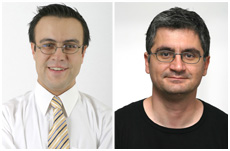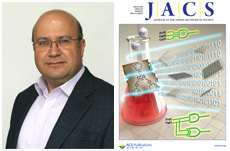Board of Trustees Meets on May 7

The Bilkent University Board of Trustees met on May 7, 2010. Present at the meeting were Chairman Ali Doğramacı, İlker Baybars, Gülsev Kale, Ahmet Nalbur, M. Lütfü Sel, Ergün Toğrol, Ergül Tunçbilek, Z. Boğaç Üner, and Rector Abdullah Atalar.
At the meeting, the Board of Trustees discussed a number of proposals that had been put forth by the University Senate. The Board approved a proposal for changing the name and content of the current Master of Fine Arts Program in Graphic Design to Media and Design.
The M.F.A. program aims to prepare students primarily for careers in the media and graphic design sectors and secondarily in the academia. Integrating practical, theoretical, interdisciplinary, and comparative approaches, the program provides students with a sophisticated conceptual and practical framework to enable them to make original contributions to both Turkish and international media and design production.
The board also approved a proposal for a new PhD program in Law at the Institute of Economic and Social Sciences.
The aim of the Phd Program is to provide scientific contributions to judicial life, and to train equipped jurists and young scientists with qualified faculty members who carry out the Phd Program within Bilkent University. In addition to these points, sharing international experiences in different areas without neglecting the national characteristic of the law is also a part of the program.
Bilkent PhD Thesis on LEDs Receives European Innovation Award


Devices and Sensors Research Group, led by Assoc. Prof. Dr. Hilmi Volkan Demir from the Department of Electrical and Electronics Engineering and the Department of Physics, has been working on the development and demonstration of high-quality light emitting diodes (LEDs) with superior photometric properties for more than five years now.
From Demir's Group, Sedat Nizamoğlu's PhD thesis on “Novel Semiconductor Quantum Dot Nanophosphors Integrated LEDs for High-Quality Lighting” received the Photonics21 Student Innovation Award.
Photonics21 is a European Technology Platform funded with the support of the European Commission to develop a coordinated strategy for the photonics community in Europe. Photonics21 is the high-level platform that brings together CEOs, CTOs, and R&D Heads of high-profile optics and photonics companies in Europe such as OSRAM, Philips, Carl Zeiss, Trumpf Laser, Cube Optics, and Ericsson, including all 27 member states of the European Union and 22 countries outside Europe.
Demir Group has been recommended to be nominated for this innovation award by European Commission 7th Framework Nanophotonics4Energy Efficiency Network of Excellence in Europe.
Professor Demir's group is working on high efficiency light generation and light harvesting in this Network of Excellence. Dr. Demir is Bilkent's principal investigator in this project. In this Network of Excellence, Sedat Nizamoğlu is working on high color-rendering, warm white LEDs with high luminous efficacy using semiconductor quantum dots at UNAM -- The National Nanotechnology Research Center. This innovation award is intended to promote research with wide-scale impact in photonics. The winner of this award is selected on the basis of world-wide innovation and potential industrial impact. The award is sponsored by Thales, SPIE Europe and ACCORD Europe organizations.
Bilkent Faculty Receive TÜBA GEBİP Awards


Asst. Prof. Emrah Özensoy of the Chemistry Department and Asst. Prof. Müfit Sezer of the Mathematics Department were among the scientists to receive an Outstanding Young Scientist Award from the Turkish Academy of Sciences (TÜBA).
TÜBA introduced the Program of Awarding Young Scientists (GEBİP) in 2001 to encourage successful researchers in the fields of natural and social sciences, engineering and medicine (TÜBA-Türkiye Bilimler Akademisi Üstün Başarılı Genç Bilim İnsanlarını Ödüllendirme Programı).
Assistant Professor Müfit Sezer received his B.S. in Electrical Engineering and Mathematics in 1994 and M.S. in Mathematics in 1996 from Boğaziçi University. He received his Ph.D. in Mathematics from Purdue University in 2003. His research interests are in the areas of Commutative Algebra and Invariant Theory. In these areas he has published several papers and delivered guest lectures in many places. Before joining Bilkent University in September 2007, Dr. Sezer worked at the University of Kent at Canterbury as a research associate, and at Boğaziçi University and Texas Tech University as an assistant professor. He has been teaching algebra and calculus at Bilkent University.
Emrah Özensoy received his B.S. degree in chemistry from the Bilkent University chemistry department in 1999 and continued his academic studies at Texas A&M University's chemistry department where he received his Ph.D. degree in chemistry in 2004. He then went on to work as a researcher at the Pacific Northwest National Laboratory's environmental molecular sciences division between 2004-2006.
Dr. Özensoy started his own research group at the Bilkent University chemistry department in 2006. His research interests focus on nano-structures with catalytic properties, electronic and structural properties of nanoparticles and ultra-thin films, as well as the design and synthesis of novel automotive emission catalysts. He is one of the authors of the book entitled “Nanotechnology and the Environment” which was published by Oxford University Press in 2005. He is also the recipient of the North American Catalysis Society Richard J. Kokes Award, American Vacuum Society Morton M. Traum Award, American Vacuum Society Graduate Research Award and Celanese Chemicals Outstanding Graduate Student Award.
|
Students Expected to Graduate in the Summer May Attend Graduation Ceremony


Starting this year, undergraduate students expecting to graduate after completing summer school will be able to attend the graduation ceremony in June.
Bilkent University has been proud to hand out actual diplomas (as opposed to symbolic ones) at the graduation ceremony, and will continue to do so. However, students who are expected to graduate upon successful completion of summer school will also be able to attend the graduation ceremony on Tuesday, June 15.
Departments will provide the names of these students to the Registrar no later than June 7. A student who expects to complete graduation requirements at the end of the summer period should be registered to all courses (within the regulations of the summer school) required for graduation by this date. These students will be able to attend the graduation ceremony where they will be handed symbolic diplomas. However, they will not be included in class rankings, since their final CGPA is uncertain.
This year graduation ceremonies will be held in three sessions on the same day. Please make sure that you arrive at the commencement site at least an hour before the ceremony begins.
Morning Ceremony:
Tuesday, June 15, 10 a.m.
Rehearsal: Monday, June 14, 10 a.m.
FE, LAW, FMPA, VSEL
Midday Ceremony:
Tuesday, June 15, 2 p.m.
Rehearsal: Monday, June 14, 2 p.m.
FHL, FADA, Faculty of Education, FS, SATM, VSTHM
Evening Ceremony:
Tuesday, June 15, 6:30 p.m.
Rehearsal: Monday, June 14, 6:30 p.m.
FBA, FEASS, SAL, VSCTOM
Prof. Dr. Engin U. Akkaya's Work on the Cover of JACS


A recent article by Prof. Dr. Engin U. Akkaya of the Chemistry Department and UNAM will be featured on the cover of the prestigious “Journal of the American Chemical Society.” The article will be published in the June 16th issue. A podcast of a brief interview will also be placed on the American Chemical Society website.
Prof. Akkaya demonstrates in his article a rational design of molecular logic gates en route to advanced molecular information processing. Use of molecules as components in computing is expected to bring us closer to massively parallel, highly efficient “wet computers,” a prime example of which, is the human brain. As opposed to current silicon-based technologies, computing based on molecules speak the same “language” as organic cells. Thus, outputs can be molecules that could interact directly with biochemical processes in health and disease. This, in turn, is expected to open the way to very smart therapeutic methodologies.
Prof. Akkaya was the recipient of the TÜBİTAK Science Award in 2009.
Also in this issue:



Bilkent News Interactive is
best viewed by 800x600 resolution.
You can send comments, questions, etc. about Bilkent News Interactive by clicking this
link.
|







